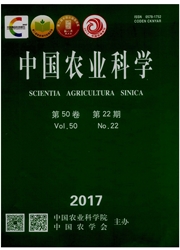

 中文摘要:
中文摘要:
【目的】研究土壤水分亏缺对Bt棉杀虫蛋白含量及Bt基因表达、氮代谢酶活性的影响,为Bt棉抗虫性安全表达提供理论参考。【方法】2014—2015年以Bt棉常规品种泗抗1号、杂交种泗抗3号为材料,采用盆栽法,2014年设置5个土壤水分处理:G1、G2、G3、G4和CK,其土壤含水量分别为最大持水量的15%、30%、45%和75%。2015年设置4个处理:G2、G3、G4和CK。观察土壤水分亏缺对盛铃期Bt棉铃壳杀虫蛋白含量影响。所有处理于盛花期前10 d控制浇水,如遇下雨,将处理盆钵移入室内。使用WET土壤三参数速测仪监测土壤水分,用称重法控制土壤水分,即当监测发现土壤水分低于设计值时,于早晨、中午、傍晚进行定量补水。2015年进一步研究水分亏缺对Bt基因表达量、氮代谢相关合成酶(硝酸还原酶和谷氨酸丙酮酸转氨酶)活性、分解酶(肽酶和蛋白酶)活性的影响。【结果】与对照(土壤含水量为最大持水量75%)相比,泗抗1号和泗抗3号铃壳中Bt蛋白含量随土壤水分亏缺程度的增加而降低,且在土壤含水量为最大持水量60%时开始显著下降,但泗抗1号下降幅度低于泗抗3号,其中2014年泗抗1号下降22.5%,泗抗3号下降41.6%。在土壤含水量为最大持水量60%时,铃壳中Bt基因表达量增加,泗抗1号、泗抗3号分别比对照提高48.6%和22.1%。氮代谢相关酶活性变化表明,水分亏缺条件下,2个类型品种的硝酸还原酶(NR)和谷氨酸丙酮酸转氨酶(GPT)活性降低,肽酶和蛋白酶活性增加。且肽酶和蛋白酶活性变化幅度高于NR和GPT。相关分析表明,NR和GPT活性与铃壳中杀虫蛋白含量呈显著或极显著正相关;肽酶和蛋白酶活性与杀虫蛋白含量呈显著负相关。【结论】水分亏缺胁迫下,供试品种铃壳中杀虫蛋白质含量下降。但在转录水平,未发现Bt基因表达量下降。但氮代谢关键合成酶(NR和GPT)活性降低,分解酶(肽?
 英文摘要:
英文摘要:
【Objective】 The effects of soil water deficit on insecticidal protein expression in boll shell of Bt gene cotton were studied. 【Method】 In 2014 and 2015, two Bt cotton cultivars Sikang 1(a conventional cultivar) and Sikang 3(a hybrid cultivar) were selected as experimental materials and were planted in pots. In 2014, five soil water contents were designed at boll peaking stage: 15% of maximum capacity of soil moisture(G1), 35% of maximum capacity of soil moisture(G2), 40% of maximum capacity of soil moisture(G3), 60% of maximum capacity of soil moisture(G4), 75% of maximum capacity of soil moisture(CK), respectively. Four treatments(G2, G3, G4, CK) were set in 2015. The effects of soil water deficit on insecticidal protein content in boll shell were determined. Ten days before flowering peak stage, watering should be controlled in each treatment. The pots were moved indoors in case of rain. At the same time, the soil water contents were monitored by WET sensor. When the soil water contents were below the designed value, the pots were watered in the morning, at noon and in the evening. On the basis of these studies, the effects of soil water deficit on Bt gene expression, activities of nitrogen metabolism-related enzymes were determined in 2015. 【Result】 The results of the two years experiments showed that the insecticidal protein content of boll shell decreased with water deficit level increasing. Compared with the control(75% of maximum capacity of soil moisture), the boll shell insecticidal protein content decreased significantly when the soil water content was below 60% of maximum capacity of soil moisture. In comparison with the control, the insecticidal protein contents of cultivar Sikang 1 and Sikang 3 decreased by 22.5% and 41.6%, respectively, with the soil water content at 60% of maximum capacity of soil moisture. However, larger increments of Bt gene expression were observed when the boll shell insecticidal protein content was significantly reduced. Comp
 同期刊论文项目
同期刊论文项目
 同项目期刊论文
同项目期刊论文
 期刊信息
期刊信息
